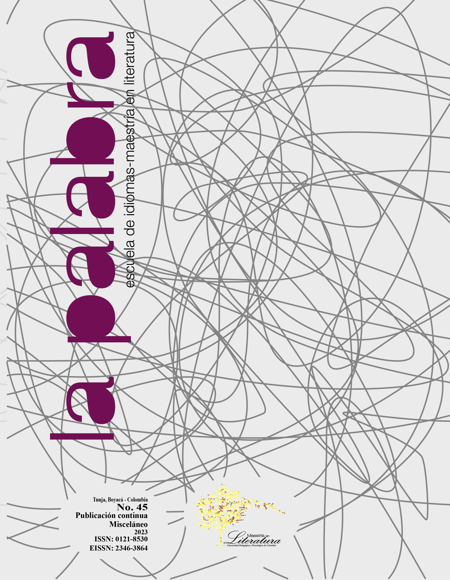Decadent Beauty and the Ultra-metalhead: a Brief Analysis of the Literary and Ideological Influences of Parabellum's Lyrics

Abstract
This article will analyze four songs by Parabellum ("Madre muerte", "666 engendro", "Bruja maldita" and "Guerra monopolio sexo") based on a three-pronged approach: the relationship between Parabellum and modern poetry, his critique of society and his view on violence. As a central theoretical tool will be Hugo Friedrich, because there are relations between the poetics proposed by the ultra-metallers of Parabellum and the style of the modern lyric. In addition, some quotes from Baudelaire and Nietzsche will be relevant, with the intention of analyzing the ideological particularities of Parabellum. Parabellum represents a time of excessive violence, but also art as that link that makes it possible to affirm life, on this occasion, through the figure of the ultra-metalhead. Parabellum, from the decadent beauty, is a band that reflects a possible escape from the vacuous reality, but also a liberation.
Keywords
Ultra metal, Parabellum, violence, affirmation of life, decadent beauty, modern lyrics, ultra-human
Author Biography
Andrés Felipe Bedoya Cely
Degree in Philosophy from the Universidad Pedagógica y Tecnológica de Colombia (UPTC). Third semester student of the Master's Degree in Literature at UPTC.
References
- Baudelaire, Charles. Diarios íntimos. Traducido por J. P. Díaz. Buenos Aires, Leviatán, 1999. Impreso.
- ---. Crítica literaria. Traducido por L. Vásquez. Madrid, Visor, 1999. Impreso.
- Calvo, Manuela. “Metal extremo y globalización en América Latina: los casos de Hermética (Argentina), Masacre (Colombia) y Brujería (México)”. Reflexiones comparadas: Desplazamientos, encuentros y contrastes, editado por María Cristina Dalmagro y Aldo Parfeniuk. Universidad Nacional de Córdoba, 2017, pp. 170-190. Impreso.
- Friedrich, Hugo. La estructura de la lírica moderna: de Baudelaire hasta nuestros días. Barcelona, Seix Barral, 1974. Impreso.
- Jaramillo, Víctor. “Mancha negra y furia o jugada maestra (una experiencia personal del metal, el punk y el harcore de Medellín)”. Corporación Otraparte, 20 de junio de 2013. Web. 20 de julio de 2022. https://www.otraparte.org/agenda-cultural/literatura/mancha-negra/
- Llácer, Toni. El super hombre y la voluntad de poder. Barcelona, Batiscafo, S. L, 2015. Impreso.
- Martínez, Silvia. “Músicas "populares" y musicología: aportaciones al estudio del heavy metal”. Cuadernos de Música Iberoamericana, vol. 4, 1997, pp. 241-257. Impreso.
- Martínez, Silvia. “Músicas "populares" y musicología: aportaciones al estudio del heavy metal”. Cuadernos de Música Iberoamericana, vol. 4, 1997, pp. 241-257. Impreso.
- Michels, Ulrich. Atlas de Música. Madrid, Alianza Editorial, 1977. Impreso.
- Nietzsche, Friedrich. El anticristo. Madrid, Alianza Editorial, 1978. Impreso.
- ---. Así habló Zaratustra. Madrid, Alianza Editorial, 2006.
- ---. Sobre la utilidad y el perjuicio de la historia para la vida. Madrid, Biblioteca Nueva, 2003.
- Niño, Yesid. “El valor de la belleza en Nietzsche y Baudelaire: una aproximación desde los fragmentos póstumos”. Quaestiones Disputatae, vol. 10, núm. 21, 2017, pp. 74-89. Impreso.
- Parabellum. Tempus mortis. Medellín, Blasfemia Récords, 2005.
- Rincón, Héctor. “El metal, la carcajada y el grito desgarrador de un espíritu muy libre”. Universitas Alphonsiana, núm. 36, 2019, pp. 67-94. Impreso.
- “¿Qué países tienen las tasas de homicidios más altas del mundo? El Salvador, entre los que encabezan la lista”. CNN español. Web. 2 de agosto de 2022. https://cnnespanol.cnn.com/2022/05/18/paises-tasas-homicidios-altas-mundo-salvador-encabezan-la-lista-orix/
